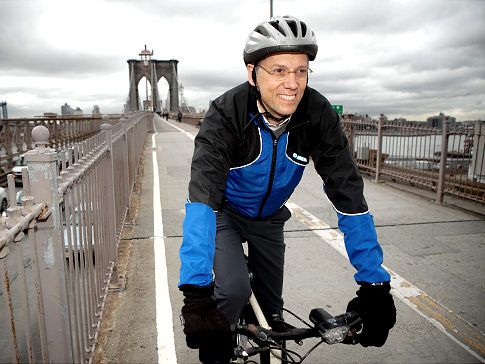
Last Friday, Transportation Alternatives kicked off a new phase of its campaign for safer streets with the Stop Speeding Summit, bringing together doctors, elected officials, transportation advocates and engineers to outline the high costs of high vehicle speeds and plot a course toward slower traffic.
We'll be bringing you a series of posts from Friday's event and wanted to let Thomas Farley, the city's health commissioner, start things off. Farley laid out the public health argument for 20 mph traffic at the summit and offered to send Health Department staff to community boards and other public meetings to lend some lab coat gravitas to livable streets arguments.
Farley made clear that building safer streets is a top priority for him as a health professional. "We are living in the era of chronic diseases and injuries as the top killers," he explained. Nearly all the top killers in New York are chronic diseases, with heart disease topping the list. "Accidents," a category which includes traffic crashes, come in at number four.
That means promoting physical activity is a public health necessity. "Even just taking transit as opposed to driving could make a substantial reduction in heart disease deaths," Farley said, adding that walking or biking for longer distances would improve health even more.
Because obesity, diabetes, high blood pressure, and other conditions correlated to the lack of physical activity are so widespread, Farley said that New York needs to address them by redesigning the city, not through individual conversations with doctors. "The way that we have an impact on the entire population is change the environment in which they live," he said.
To that end, Farley endorsed both traffic calming and bike lanes as changes that make it safer, easier and more pleasant to get physical activity. Street redesigns also help reduce injuries and deaths sustained in traffic crashes. While New York's streets are extremely safe by national standards, said Farley, the number of traffic fatalities and injuries remains indefensibly high. The Department of Health released a short report on traffic safety this morning [PDF].
Farley also endorsed taking steps to reduce traffic speeds. "We definitely are in favor of having lower speeds to reduce injuries," he said, though he couldn't say what approach might be the most effective. He did imply that addressing the problem would entail more than cracking down on those driving above the city's 30 mph speed limits. "There's a huge difference between being struck at 30 mph and 20 mph," said Farley.
And for the hard-working activists in the trenches, working to convince New York's community boards to get behind street safety, Farley made a promise they'll be sure to appreciate. He said he'd be happy to send Department of Health staff to community board meetings whenever it would help bolster the argument for safety.





